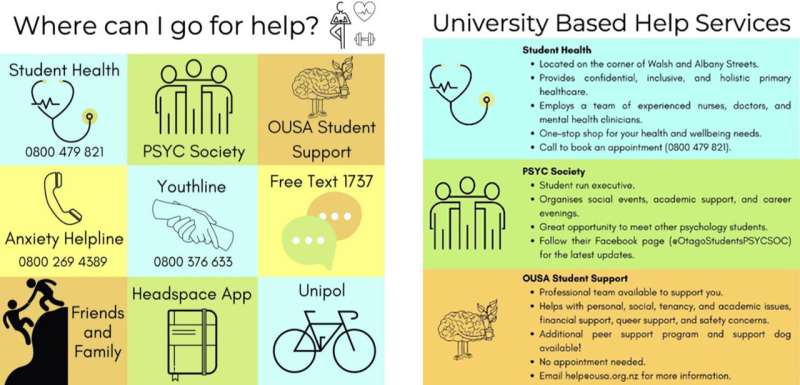Simple intervention may encourage accessing of mental health services

Despite being known as a vulnerable group for experiencing poor mental health, tertiary students often downplay the severity of their distress and delay seeking help, University of Otago research has found.
However, the researchers also developed a simple infographic which increased students' motivation to access support services and reduced their perception that their issues were not serious enough to seek help.
Lead author Andre Mason, Ph.D. candidate in the Department of Psychology, says university students around the world are susceptible to significant mental distress and suicidal ideation, but are also often hesitant to seek help when they have a problem.
"Understanding why students are hesitant is, therefore, of critical importance to being able to shift our therapeutic approaches to be able to better support them.
"We need to develop a way to better communicate with students the benefit of seeking support early and increasing the understanding that a mental health 'check in' is a good thing, regardless of how 'big' the issue is," he says.
The research, published in the International Journal of Environmental Research and Public Health, combined two studies of Aotearoa New Zealand university students.
The first, which involved 373 participants, aimed to understand perceived barriers to seeking help when they experience mental distress and, or suicidal ideation.
The main barriers were wanting to handle issues independently and the belief their problems were not severe enough to seek help.
"This is concerning in light of the level of distress the students we sampled were experiencing, which included clinically relevant symptoms of depression, anxiety, and stress, and recent thoughts about suicide," Mr. Mason says.
Interestingly, contrary to anecdotal evidence, time, scheduling, and transport were perceived to be the least important obstacles.
The second study was a follow-up aimed at assessing the impact of a brief mental health promotion video and infographic, highlighting the main support services available to students.
The infographic had a positive effect on intentions to seek help, but the video had no effect.
"Often the simplest interventions are most easily absorbed. Our focus was to develop something that could easily communicate the range of services that existed and communicate to students that it is okay to ask for support at any level of severity.
"Our hope would be that they gain confidence to seek help early which would allow health professionals to take a more preventive approach."
The next step is for the researchers to test the infographic's effectiveness in a more natural setting, such as a social media feed.
"It is important to note, however, that we need to ensure there is capacity to meet demand before the intervention developed in the present study is up scaled. We cannot focus solely on reducing perceived barriers if structural barriers such as availability and scheduling remain—we need to continue to consider innovative solutions towards more prevention-focused strategies for mental health policies."
More information: Andre Mason et al, Understanding Aotearoa New Zealand University Students Intentions to Seek Help If Experiencing Mental Distress: A Comparison of Naturalistic and Interventional Findings, International Journal of Environmental Research and Public Health (2022). DOI: 10.3390/ijerph192315836




















